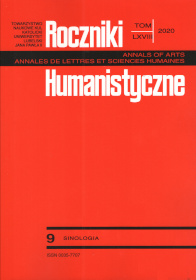The Evolution of China’s Political System in the Reform and Opening-Up Era: Structures, Processes and Challenges. Part I: 1978-2002
Abstract
This paper examines the main features of the political system in the People’s Republic of China and the changes in the power structure of the Communist Party of China since the introduction of the reform and opening-up policy. The author analyses the key features of the decision-making process, institutions, model of governance and leadership of the PRC during the eras of Deng Xiaoping, Jiang Zemin, Hu Jintao and Xi Jinping. Since the beginning of the 1980s, China’s political system has undergone a transformation from one-man rule to a “collective leadership”, facing various challenges in governing the country and upholding the process of reform. The deepening of economic reforms, which began in the 1990s required a significant improvement in the state’s ability to govern and its adoption of a more flexible approach to the Party’s guiding ideology. As a result, China’s top decision-making bodies started to evolve into professional governing boards supported by highly educated cadres, experts and think-tanks. However, the end of Deng Xiaoping’s “strong-hand” rule led to the formation of a number of factions and interest groups within the Party’s establishment, each holding different views on the way, and the extent to which, such reforms should be pursued. During the last two decades, this factional struggle has exerted a negative influence on China’s economic and social transformation, as well as initiating the process of internal decay in the Party. Facing a growing number of challenges in China’s development and a lack of political unity within the CPC, the present leadership has strived to reorder the power structure and streamline the process of reform. Although it has managed to consolidate political power and partly eliminate some of the gravest problems, such as corruption, discord within the Party has prevailed and increased, leading to a visible decline in the reforms over the past few years, as well as to a growing number of voices demanding a thorough change in the political system. This paper concludes with remarks regarding the further evolution of the political system in the PRC, and possible developments in the Party’s leadership.
References
Bogusz, Michał, i Jakub Jakóbowski. Komunistyczna Partia Chin i jej państwo. Konserwatywny zwrot Xi Jinpinga. Ośrodek Studiów Wschodnich im. M. Karpia, 2019.
Burski, Ksawery. „Biuro Polityczne KPCh na ciągłym szkoleniu”. Azja–Pacyfik, vol. 18, 2015, ss. 280-284.
Burski, Ksawery. „Rozkwit chińskich think-tanków i nowe oczekiwania wobec nich”. Azja–Pacyfik, t. 18, 2015, ss. 271-279.
Fewsmith, Joseph. The Logic and Limits of Political Reform in China. Cambridge University Press, 2012.
Jakóbowski, Jakub. Dryf chińskich reform. Polityka gospodarcza pierwszej kadencji Xi Jinpinga. Ośrodek Studiów Wschodnich im. M. Karpia, 2017.
Li, Cheng. „Educational and Professional Backgrounds of Current Provincial Leaders”. China Leadership Monitor, vol. 8, no. 18, 2003, ss. 1-9, media.hoover.org/sites/default/files/ documents/clm8_lc.pdf. Dostęp 2.06.2020.
Li, Cheng. Chinese Politics in the Xi Jinping Era: Reassessing Collective Leadership. Brookings Institution Press, 2016.
Lieberthal, Kenneth, Cheng Li, i Yu Keping, China’s Political Development: Chinese and American Perspectives. Brookings Institution Press, 2014.
MacFarquhar, Roderick. „Leadership Styles at the Party Center: From Mao Zedong to Xi Jinping”. China’s Core Executive. Leadership styles, structures and processes under Xi Jinping, red. Sebastian Heilmann and Matthias Stepan, Mercator Institute for China Studies, 2016, ss. 14-17.
Shambaugh, David. „The Dynamics of Elite Politics during the Jiang Era”. China Journal, no. 45, 2001, ss. 101-111, www.brookings.edu/articles/the-dynamics-of-elite-politics-during-the-jiang-era. Dostęp 2.06.2020.
Shambaugh, David. China’s Communist Party: Atrophy and Adaptation. Woodrow Wilson Center Press, 2008.
Shirk, Susan. China: Fragile Superpower. Oxford University Press, 2008.
Wo-Lap Lam, Willy. Changing of the Guard: Beijing Grooms Sixth-Generation Cadres for 2020s. The Jamestown Foundation, 2010.
Wo-Lap Lam, Willy. Chinese Politics in the Hu Jintao Era: New Leaders, New Challenges. M.E. Sharpe, 2006.
Wo-Lap Lam, Willy. The Era of Jiang Zemin. Prentice Hall, 1999.
Xue, Gangling 学, 纲领. Xingzheng tizhi gaige yanjiu 行政体制改革研究. Beijing daxue chubanshe 北京大学出版社, 2006.
Yang, Dali L. “What Holds the Giants Together? Institutions and Center-local Relations in China”. Draft paper prepared for the conference on “Rule and Reform in the Giants: China and India Compared”, Harvard University, November 3 – December 2, 2007.
Yifu Lin, Justin. Demystifying the Chinese Economy. Cambridge University Press, 2011.
Yu, Keping. Democracy in China: Challenge or Opportunity. World Scientific Publishing, 2016.
Zheng, Yongnian. Globalisation and State Transformation in China. Cambridge University Press, 2004.
Copyright (c) 2020 Roczniki Humanistyczne

This work is licensed under a Creative Commons Attribution-NonCommercial-NoDerivatives 4.0 International License.





